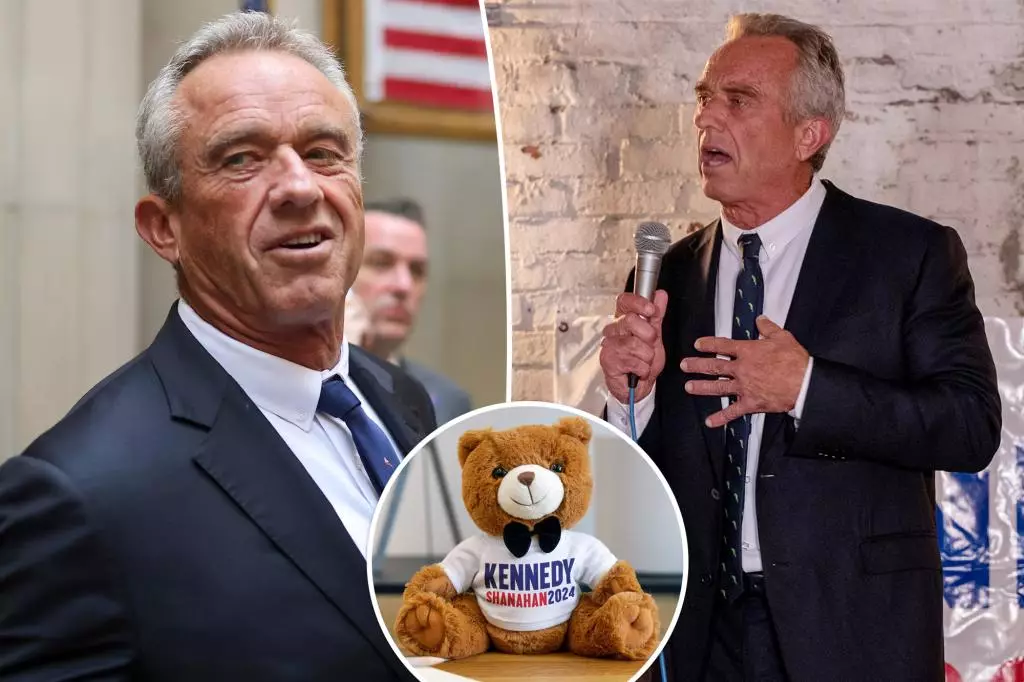Robert F. Kennedy Jr. (RFK Jr.) is a man caught in the crosshairs of media scrutiny, facing a personal and political fallout that rivals any tumultuous chapter in history. As a descendant of the famed Kennedy family, RFK Jr. has continuously navigated the tumult of his family’s legacy while carving out his unique identity within the political arena. Despite facing allegations surrounding a potential sexting scandal and rumored extramarital affairs—claims that he has vigorously denied—RFK Jr. appears resolutely committed to his political ambitions. A close source reveals that he anticipated this turbulence and accepted it as part of his journey. “He feels he is engaged in a mission of divine importance, striving to disseminate his beliefs and fight against societal issues,” asserts the insider. This unwavering dedication raises interesting questions: How much personal sacrifice is one willing to endure for political idealism?
The endorsement of Donald Trump in August has become a pivotal moment in RFK Jr.’s political career, inciting a backlash not only from critics outside his family but also from relatives who have publicly denounced his actions. This division highlights an intrinsic challenge that long-established political families face: the discord between generational values. Members of the Kennedy family have explicitly reiterated their belief that RFK Jr.’s support for Trump is antithetical to the ideals instilled within them. Their statement underscores a desire for America characterized by hope and unity, sharply contrasting with Kennedy’s chosen political allegiance. Such a rift elucidates a more significant cultural schism within American politics, where individual ideologies now threaten to unravel family legacies and shared beliefs.
Despite familial denouncements, RFK Jr. stands firm in his conviction, suggesting that he perceives his endorsement as aligned with his broader “mission.” He maintains that his decision stems from a belief that true discourse requires embracing diverse perspectives—even those that may seem radically polarizing. This brings forth a compelling discussion around the balance between personal beliefs and familial bonds. Can one pursue political individuality at the cost of traditional allegiance, especially in a family so intertwined with Democratic politics?
RFK Jr.’s personal life further complicates his political narrative, as recent reports have emerged of a romantic relationship with Olivia Nuzzi, a prominent journalist. Allegations of their textual communications and explicit FaceTime interactions have sparked further scrutiny. While Kennedy denies any physical involvement, the potential fallout from wounded relationships raises the question of whether the personal sins of a public figure can overshadow their political messages.
Moreover, Nuzzi’s recent leave from her publication casts a shadow over the ethical implications of their liaison, drawing attention to the overlaps between media and politics. This situation invites concerns regarding the integrity of journalists and the obligations they bear when intersecting with political figures in personal realms.
Cheryl Hines, RFK Jr.’s wife, reportedly feels aggrieved by his actions, indicative of the strain that political shifts can exert on personal relationships. Her perspective as a lifelong Democrat complicates the narrative further, suggesting that the political divide might be spilling over into their domestic domain. Herein lies a tale of family dynamics, marital fidelity, and political alignments clashing—a metaphor for the wider fractures currently evident in American society.
While RFK Jr. attempts to navigate these turbulent waters, his story is emblematic of larger cultural shifts at play. In an era where political identity often feels interchangeable with personal identity, figures like RFK Jr. challenge us to reconsider the very nature of political fidelity. Can one still uphold the values of a family legacy while diverging into uncharted personal and political territory?
Ultimately, Robert F. Kennedy Jr.’s journey reflects the complexities of balancing authenticity, loyalty, and ambition in a landscape fraught with public scrutiny and familial expectations. His story continues to unfold against a backdrop of personal scandals and political upheaval, embodying the multifaceted nature of what it means to be a Kennedy in today’s America. As RFK Jr. forges ahead, he must confront the very real dilemmas that accompany his quest for political resurrection amid personal contradictions. The uncharted territory ahead will not only test his resolve but may also redefine the contours of generational dynamics within the Kennedy lineage.


Leave a Reply